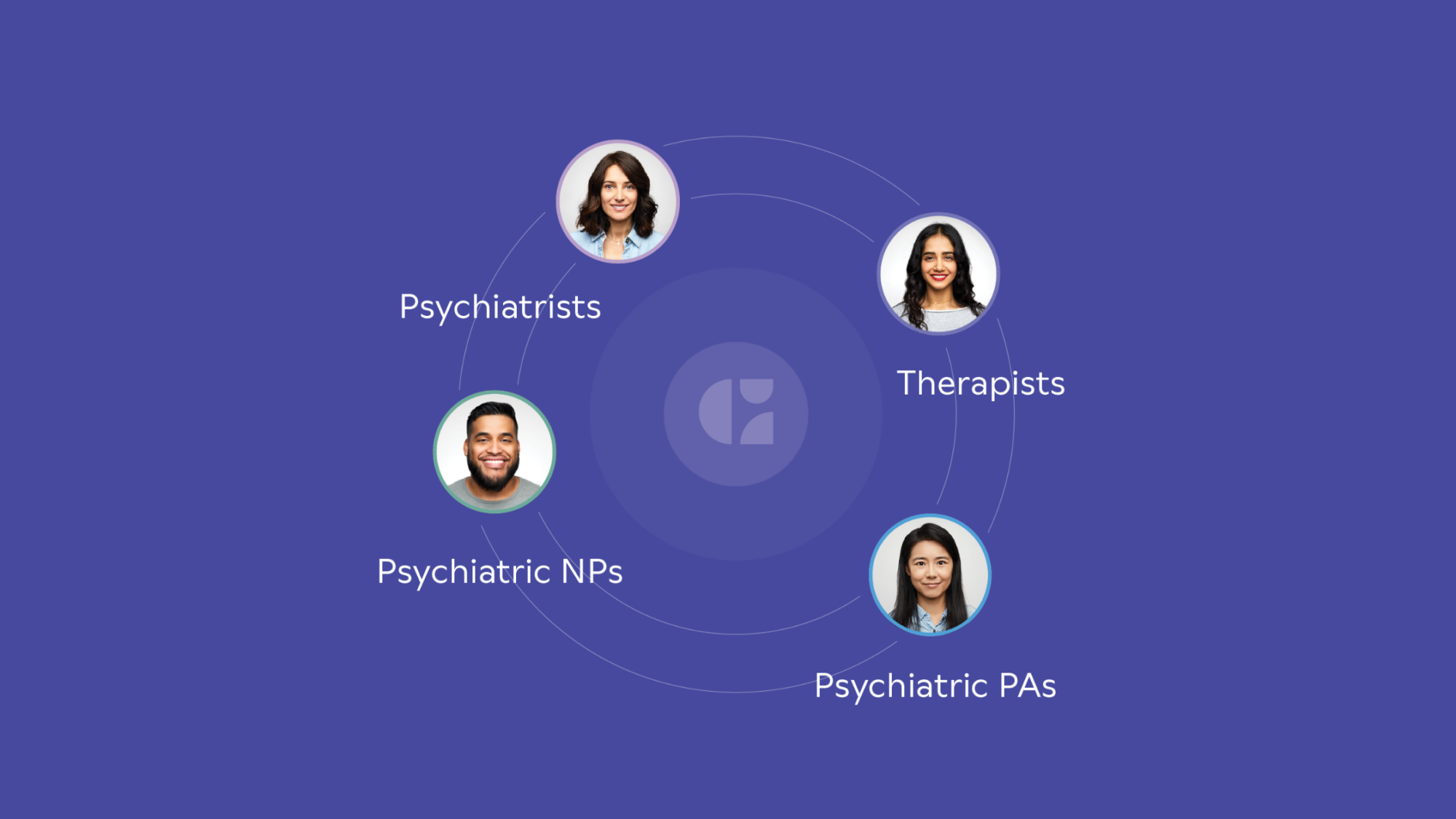
When you suffer an injury that impacts both your bones and muscles – like a broken leg from a car accident – you would not rely on just one healthcare professional to get back on your feet. You would see an orthopedic surgeon to address the bone fracture and a physical therapist to restore mobility and strength. These professionals work in tandem, each playing a critical role in your recovery. The orthopedic surgeon may eventually step back once the fracture has healed, but the physical therapist continues to guide you through rehabilitation, keeping the surgeon updated on your progress.
So, why should mental health treatment be any different?
Mental health is a complex and multi-faceted part of our overall well-being. Just as an injury requires multiple professionals to help you recover, mental health treatment often benefits from the combined expertise of both psychiatrists and therapists. At Geode Health, we have found that providing accessible, collaborative care—by bringing together psychiatrists, psychiatric nurse practitioners, physician assistants, and therapists under one roof—results in more effective treatment for our patients.

Why Combining Psychiatry and Therapy Matters
When it comes to mental health, there are many variables at play: the condition, its severity, the patient’s background, and their previous experiences with treatment. So, when is therapy enough? When does medication suffice? The answer is not always straightforward. However, research has repeatedly shown that combining psychiatry (medication management) with psychotherapy provides the best results for many patients.
You don’t need to delve into every study to see the benefits. However, consider this: According to the National Library of Medicine, combining psychotherapy with pharmacotherapy for conditions like depression can increase the likelihood of achieving remission, shorten the time required to reach remission, and improve treatment adherence.
“Combination treatment during acute and continuation phases may increase the likelihood of achieving remission, shorten the time required to achieve remission, and enhance adherence to treatment.” – National Library of Medicine (PMC6519650)
While depression is one of the most common conditions people seek help for, it is not the only one. Yet, many studies on combined approaches focus on depression because of its widespread impact.
A More Impactful Approach to Mental Healthcare: Real-Life Cases to Support the Claim
At Geode Health, we see the difference firsthand in our patients’ outcomes. Our integrated approach, which brings together psychiatrists, psychiatric nurse practitioners, physician assistants, and therapists, enables us to provide tailored care that patients need—without the hassle of navigating multiple providers or offices.
“We’ve consistently seen how effective it is when our patients have both psychiatric and therapeutic support,” states Donna Czech, Psychiatric Nurse Practitioner at Geode in Chicago, IL. “For some, medication helps stabilize their symptoms enough to engage in therapy more effectively. For others, therapy provides them with coping skills that help them stay on track with their medication regimen. This integration accelerates healing and helps patients feel more in control of their mental health. In addition, I can get a sense of how the medication might be working between psychiatry appointments based on the therapist’s reports, and this allows me to be better prepared for my next appointment with the patient.”
We understand that there is no “one-size-fits-all” approach to mental health care. That’s why we personalize treatment plans based on each patient’s unique needs.
Given that Geode was founded on providing access to a full spectrum of care in one place, we have the experience to prove its worth. Sharing just a few of the countless instances of this are some of our own providers collaborating care for patients within the walls of our treatment centers. Whenever appropriate, once therapy was introduced alongside medication, the patient began to experience a shift. The therapist helped them work through negative thought patterns, and the medication provided the stability they needed to actively engage in therapy. Together, the two approaches allowed the patient to make meaningful progress in less time.
Case 1: A Breakthrough with Depression
Before Combining Treatment
A patient came to us struggling with persistent feelings of sadness and a lack of energy. After an initial evaluation, they were prescribed medication by our psychiatrist. However, despite the medication, they continued to feel stuck and unable to engage in daily activities.
After Combining Psychiatry and Therapy
Czech shares that by adding therapy to the medication regimen, this patient was able to process and address underlying issues contributing to their depression. “Once the patient was working with one of our therapists, I gained a better understanding of why a patient might struggle with medication adherence. In this instance, the patient was struggling with low self-esteem and a feeling that they didn’t ‘deserve’ to feel better,” she explained. “Therapy was the key to getting this patient on the right track to progress with treatment.”
Case 2: Overcoming Anxiety with Medication Adjustment
Before Combining Treatment
A different patient had been receiving therapy for anxiety for months but found limited improvement. The therapist noticed that the anxiety was rooted in chemical imbalances and suggested they consult with a psychiatrist for anxiety. After a medication adjustment, the patient experienced a significant reduction in their symptoms.
After Combining Psychiatry and Therapy
With therapy and medication in place, the patient felt more balanced and engaged in their therapeutic process.
“The combination approach allowed the patient to reach a level of calmness that made therapy much more productive, said Lisa Raciak, therapist at Geode’s Joliet and Bolingbrook offices in Illinois. “Without the psychiatric support, their anxiety would have remained overwhelming and less manageable.”
Therapy helped to refine coping strategies and build resilience, while medication addressed the physiological aspects of anxiety.
Case 3: Tackling Medication Compliance with Therapy
Before Combining Treatment
A patient was prescribed psychiatric medication to manage their depression and anxiety. However, the psychiatrist noticed that the patient had not completed the necessary blood work to assess specific health markers related to the medication. Despite multiple reminders, the patient continued to delay the tests. This lack of follow-through raised concerns about the effectiveness of the prescribed treatment. For some patients, staying consistent with anxiety medicines can be especially challenging without the added support of therapy.
After Combining Psychiatry and Therapy
Once therapy was introduced to the patient’s treatment plan, the therapist collaborated with the psychiatrist to address the issue of non-compliance. “In therapy, we explored the patient’s anxiety about needles and medical procedures, helping them pinpoint where these fears stemmed from,” said Raciak. “Together, we developed coping strategies, including relaxation techniques and positive reframing, to reduce anxiety and increase the patient’s confidence in completing the tests.”
Meanwhile, the psychiatrist reinforced the importance of the blood work for the patient’s health and the treatment’s efficacy. “The doctor had confidence that I could help address the emotional barriers to getting the tests done,” explained Raciak. “This collaboration created a more holistic approach, allowing the patient to feel supported both medically and emotionally, which ultimately led to their completion of the necessary tests.”
Case 4: ADHD and the Power of Collaboration
Before Combining Treatment
A patient diagnosed with ADHD had been managing symptoms primarily with medication prescribed by the psychiatrist. However, the patient continued to struggle with organizational issues, impulsivity, and staying on task, which impacted their personal and professional life. While the medication was helping, there was a clear need for additional support to develop coping strategies and organizational skills.
After Combining Psychiatry and Therapy
The therapist worked closely with the patient to address these struggles, using behavioral strategies to help the patient develop better time management and organizational skills. They also focused on improving their self-esteem and coping strategies when they encountered distractions.
“By adjusting the medication and collaborating with the therapist, we were able to fine-tune the treatment plan, shared Czech. “Medication helped reduce the impulsivity and improve focus, while therapy provided tools for better organization and managing everyday challenges. This holistic approach not only supported the patient’s medication regimen but also gave them the skills they needed to thrive outside of the therapy room.”
Why Geode Health Stands Out
At Geode Health, we strive to deliver accessible, personalized, and collaborative mental health care. We believe in the power of a combined approach, and we have seen it work repeatedly with our patients. Offering both psychiatric care and therapy under one roof makes it easier for patients to access comprehensive treatment, ensuring that both aspects of care are aligned.
“Having psychiatrists and therapists on the same team creates a seamless patient experience. It ensures continuity of care and enhances the overall effectiveness of the treatment plan,” stated Czech. “When a patient has two providers working together to support the patient, it’s a win for everyone involved.”
We are proud to offer this integrated, patient-centered approach, which we have found far more effective than relying on either medication or therapy alone. By addressing both the psychological and physiological aspects of mental health, patients at Geode Health can achieve more lasting and meaningful improvements.
Continuing Our Pursuit of Effective Mental Healthcare
Mental health is a complex issue, and no two individuals experience it in the same way. Learning how to choose a psychiatrist is an important step, and combining psychiatry with therapy provides the best opportunity for healing and growth for patients. At Geode Health, our collaborative, team-based approach ensures that our patients receive the most comprehensive care possible, all in one place. Whether you’re looking for a therapist in Joliet IL or a therapist in Flower Mound TX. We’re here to support you every step of the way on your journey to better mental health.
Schedule an appointment with a Geode provider today at book.geodehealth.com.


